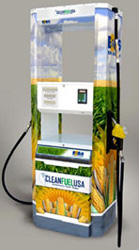 Local and state officials in Pennsylvania have received a first-hand, behind-the-scenes tour of the new Lake Erie Biofuels plant at the site of the former International Paper plant near Erie, PA.
Local and state officials in Pennsylvania have received a first-hand, behind-the-scenes tour of the new Lake Erie Biofuels plant at the site of the former International Paper plant near Erie, PA.
This story in the Erie (PA) Times-News says they were impressed with what they saw at the 45-million-gallon-a-year facility:
“I must have read a million things about this place, but until you see it, you don’t get a full understanding of it,” said Dennis Yablonsky, secretary of the Pennsylvania Department of Community and Economic Development.
Yablonsky led a delegation of local and state officials on a tour of the biodiesel plant, which has grown over the past two years at the East Lake Road site that once held the International Paper plant.
In November, state, federal and local government officials joined Erie Management Group to cut the ribbon on the $60 million facility that has the capacity to produce 45 million gallons of biodiesel a year.
Now, five months later, Erie Management Group founder Samuel P. “Pat” Black said he is happy with the progress of the $60 million plant. And government development officials said the $15 million that government programs pumped into the former IP site and its infrastructure is also paying off.
“Absolutely we are happy with it,” said Monica Brower, chief executive of the Economic Development Corp. of Erie County. “We have had almost $85½ million of (private and public) investment in this site, and it has only been two years. To be able to do this in just two years … it’s amazing.”
The story also has the following link with video so you can see it, too. Check it out!



 Senate President Pro Tem Glenn McConnell’s (R-Charleston) three bills were presented to a state Senate Finance Committee this week.
Senate President Pro Tem Glenn McConnell’s (R-Charleston) three bills were presented to a state Senate Finance Committee this week.  A project north of the border could turn waste plastic into biodiesel.
A project north of the border could turn waste plastic into biodiesel.  “I would say our biggest hurdle is the potential cost to the retailer of putting infrastructure in and the education needed to get customers to support that,” said Robert White, of the Ethanol Promotion and Information Council, a trade group.
“I would say our biggest hurdle is the potential cost to the retailer of putting infrastructure in and the education needed to get customers to support that,” said Robert White, of the Ethanol Promotion and Information Council, a trade group. According to a
According to a  Wisconsin’s first soybean crushing facility is being built… thanks to a $4 million grant from the state.
Wisconsin’s first soybean crushing facility is being built… thanks to a $4 million grant from the state. A ferry carrying 124 cars in Washington State’s Puget Sound has been running on biodiesel since last month, and officials are hoping to expand the green fuel into another transport.
A ferry carrying 124 cars in Washington State’s Puget Sound has been running on biodiesel since last month, and officials are hoping to expand the green fuel into another transport. Fifty years ago, you could see acres and acres of flax growing in the southern part of Texas. Today, the crop once grown for vegetable oil, is finding new life as a feedstock for biodiesel.
Fifty years ago, you could see acres and acres of flax growing in the southern part of Texas. Today, the crop once grown for vegetable oil, is finding new life as a feedstock for biodiesel. “It’s kind of like we’re coming full circle,” said Dr. Gaylon Morgan, small grains researcher and member of the Texas A&M AgriLife project team. “Flax was grown on about 400,000 acres during that time and Texas AgriLife Research had an active flax breeding program.
“It’s kind of like we’re coming full circle,” said Dr. Gaylon Morgan, small grains researcher and member of the Texas A&M AgriLife project team. “Flax was grown on about 400,000 acres during that time and Texas AgriLife Research had an active flax breeding program. “Schools, truck drivers, small businesses and families across the commonwealth are feeling the pressure of higher fuel bills on their budgets and wallets,” said McGinty. “Switching from conventional fuels to homegrown biofuels will help break our addiction to foreign oil, bring down costs, strengthen national security, and grow our economy.
“Schools, truck drivers, small businesses and families across the commonwealth are feeling the pressure of higher fuel bills on their budgets and wallets,” said McGinty. “Switching from conventional fuels to homegrown biofuels will help break our addiction to foreign oil, bring down costs, strengthen national security, and grow our economy. Roe explains that Coskata combines both biological and thermochemical processing and can use a wide variety of feedstocks, from wood chips, weeds and non-food crops like miscanthus, to even human waste and carbon-heavy garbage like tires.
Roe explains that Coskata combines both biological and thermochemical processing and can use a wide variety of feedstocks, from wood chips, weeds and non-food crops like miscanthus, to even human waste and carbon-heavy garbage like tires.